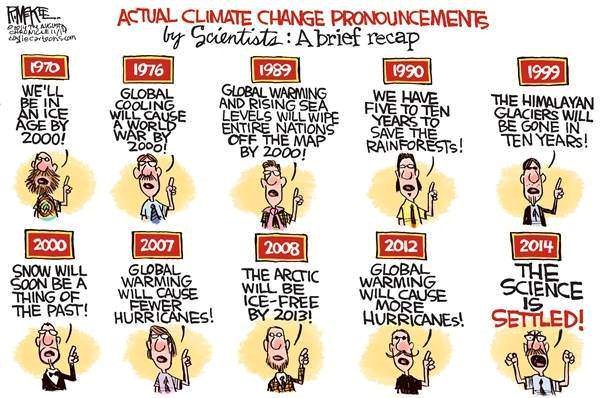The Amazing Arrogance of the Paris Climate Agreement
It was December 12, 2015, when headlines in the world’s leading newspapers, in implausibly bold type, celebrated the “historic” agreement in Paris between all nations of the world to curb carbon emissions and thereby stop climate change: or so they said, as if elites get to say what is and is not historic.
The spin, like the agreement itself, was crammed down our throats.
I read the stories that day, and the next and the next, and the continuing coverage for weeks that nearly every reader – apart from a few dedicated activists and permanent regime bureaucrats – ignored. The stories appeared on the international pages and didn’t touch the business pages. Energy stocks weren’t affected in the slightest.
The stories had all the signs of dutiful public service announcements – “fake news,” as they say today – and they contained not a single quote from a single dissenting voice, because, of course, no respectable news outlet would give voice to “climate deniers.”
Deniers?

Let me pause to protest this “denial” language. It attempts to appropriate the widely shared disgust toward “Holocaust denial,” a bizarre and bedraggled movement that belittles or even dismisses the actual history of one of the 20th century’s most egregious mass crimes against human rights and dignity. Using that language to silence questions about an attempt to centrally plan the energy sector is a moral low that debases the language of denial.
This rhetorical trick reveals all you need to know about the desperate manipulation the climate planners are willing to engage in to realize their plot regardless of popular and justified skepticism concerning their regulatory and redistributionist policies.
And what are the specifics of that agenda? The Paris Agreement is a “voluntary” agreement because its architects knew it would never pass the US Senate as a treaty. Why? Because the idea of the agreement is that the US government’s regulatory agencies would impose extreme mandates on its energy sector: how it should work, what kinds of emissions it should produce, the best ways to power our lives (read: not fossil fuels), and hand over to developing world regimes billions and even trillions of dollars in aid, a direct and ongoing forcible transfer of wealth from American taxpayers to regimes all over the world, at the expense of American freedom and prosperity.
And you wonder why many people have doubts about it.
The Trumpist Reaction
Consider what else was going on December 12, 2015. Donald Trump was in the midst of a big battle for the Republican nomination. He started with 16 challengers to beat. He was widely considered to be a clownish candidate, a guy in it just to get press attention to build his business brand. Surely the American system of electoral politics, largely but imperfectly managed by responsible elites, would resist such demagogues. Besides, the media that trumpeted the Paris Agreement would be on hand to shame anyone who supported him. He couldn’t win.
The press mostly pretended that he wasn’t happening. The Huffington Post put coverage of his campaign in the humor section.
And so President Obama came home from the Paris meetings to the acclaim of all the right people. He alone had made the responsible choice on behalf of the entire country: every business, every worker, every consumer, every single person living within these borders who uses some measure of this thing we call energy. He would be our master and commander, ruling on our behalf, fresh off cocktail parties in Paris where the best and brightest – armed with briefcases full of government-funded science – decided to give the Industrial Revolution its final comeuppance.
The exuberant spokespeople talked about how “the United States” had “agreed” to “curb its emissions” and “fund” the building of fossil-free sectors all over the world. It was strange because the “United States” had not in fact agreed to anything: not a single voter, worker, owner, or citizen. Not even the House or Senate were involved. This was entirely an elite undertaking to manage property they did not own and lives that were not theirs to control.
The Backlash
And then Trump spoke. He said that this Paris bit was a bad deal for Americans. We are already in a slow-growth economy. Now these global elites, without a vote from Congress, are presuming to mandate massive controls over the economy, hampering its productive sector which benefits everyone and transferring countless billions of dollars out of the country, with the acquiescence of the party in power.
He spoke about this in a way that bested all his opponents. The entire scenario fed his America First worldview, that the global elites were operating as parasites on American prosperity and sovereignty. His answer was to put up the wall: to immigrants, to trade, to global managerial elites, and reclaim American sovereignty from people who were selling it out. It was another flavor of statism (globalism and nativism are two sides of the same coin), but it tapped into that populist vein of the voting public that looks for a patriotic strongman to save them from a distant ruling class.
Everything about the Paris Agreement seemed structured to play into Trump’s narrative of how the world had gone mad. And then he won the nomination. Then he won the presidency. None of this was supposed to happen. It wasn’t part of the plan. History took a different course from what the power elite demanded and expected to happen. Not for the first time.
How Dare Anyone Dispute Our Plans?
But the “globalists” of the type that tried to make Paris work have a stunning lack of self-awareness. They pretend to be oblivious to the populist resentment they breed. They act as if there is not a single legitimate doubt about the problem, their analysis of cause and effect, the discernment of their selected experts, or their proposed coercive solution. And there certainly isn’t a doubt that their mighty combination of power, resources, and intelligence can cause all the forces in the universe to adapt to their will, including even the climate that King Canute himself said could not be controlled by kings and princes.
As with countless other statist plans over the last hundred years, they figured that it was enough to gather all the right people in one room, agree to a wish list, sign a few documents, and then watch the course of history conform to their wishes.
The Paris Agreement is no different in its epistemological conceit than Obamacare, the war on drugs, nation-building, universal schooling, or socialism itself. They are all attempts to subvert the capacity of society to manage itself on behalf of the deluded dreams of a few people with power and their lust for controlling social and economic outcomes.
Rejecting Elite Politics
How far are the Democrats from recognizing what they have done? Very, very far. John C. Williams, writing in the New York Times, has decried the “The Dumb Politics of Elite Condescension”:
“As a progressive, I am committed to social equality – not just for some groups, but for all groups… Everyone should have access to good housing and good jobs. That’s the point… Too often in otherwise polite society, elites (progressives emphatically included) unselfconsciously belittle working-class whites. Democrats should stop insulting people.”
That would be a good start. But it is not only about rhetoric. Policy preferences have to change. A global agreement that somehow binds entire countries to centrally plan and regulate the whole of a crucial sector of economic life that supports all economic advances of our time – at the very time when the energy sector is innovating its own solutions to carbon emissions in the cheapest possible way – is certainly going to breed resentment, and for good reason. It is a bad and unworkable idea.
Continued reliance on undemocratic, uneconomic, imposed strategies such as the Paris Agreement will only further feed the populist revolt that could end in the worst possible policy combinations of strong-man nationalism, nativism, protectionism, closed borders, and backwards thinking in general. No good can come from this. The backlash against globalism can be as dangerous as globalism itself.
You might think that the election of Trump would offer some lessons. But that is not the way the arrogant minds behind the climate agreement work. They respond by merely doubling down on disdain, intensifying their commitments to each other, heaping more loathing on the workers and peasants who have their doubts about these deals.
Trump and his ilk abroad, backed by voting masses with pitchforks and torches – and not a managed transition from fossil fuels to clean energy – are their creation.
Jeffrey Tucker is Director of Content for the Foundation for Economic Education. He is also Chief Liberty Officer and founder of Liberty.me, Distinguished Honorary Member of Mises Brazil, research fellow at the Acton Institute, policy adviser of the Heartland Institute, founder of the CryptoCurrency Conference, member of the editorial board of the Molinari Review, an advisor to the blockchain application builder Factom, and author of five books. He has written 150 introductions to books and many thousands of articles appearing in the scholarly and popular press.
This article was originally published on FEE.org. Read the original article.


